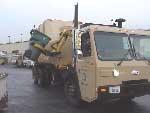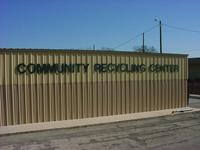
How your trash leaves your house is usually determined by city, or sometimes county, politicians, who give policy instructions to waste management authorities. Often, the details are further left to a private contractor.
All these people can have an impact on how hard -- or easy -- it is to be green when it comes to recycling. As a result, if your town doesn't use The Good Way with a little financial incentive (see below) drop me an email and we can come up with a way to change that.
As it happens, the easiset way is far from the best way.
The Hard Way: D.I.Y.
One way to be green is to Do-It-Yourself, to collect your recyclables and turn them into cash-- er reusable materials -- without any city help at all.
Mostly this falls into the catagory of Rigorous Earth Friendly Lifestyle (REFL) and while this may be fine for some, we are all about easy. Oh sure, you can collect your paper, your aluminum, your steel, your numbered plastics, your glass, etc., sort them and schlep them down to your local recycling center, but its a lot of work.
And that means for most of us that we would never get started, or would start, but eventually toss two or three trash bags of unreclaimed recyclables into the trash can. Getting the City or other jurisdiciton that handles your trash to do it for you is much easier. And of course municipal governments have a motivator to pull all the recyclables out of the trash that they can since many states (including California) require cities to reduce the amount of stuff going into landfills.
Believe it or not, once folks actually expected the D.I.Y. method to work, and cities set up dozens of recycling centers for public spirited citizens to bring their recylable stuff to. It worked okay, especially for the Truly Public Spirited and Hardcore Greenies. I even spent some time sorting glass by color as a Boy Scout at a voluntary recycle center. Some communities still do things this way.
The City of Kernville Community Recycling Center
Voluntary or D.I.Y. programs are The Hard Way, but they are certainly better than No Way. These are most often found, still, in very small or isolated communities.
Now, there are second-generation D.I.Y. centers in place where you can get cash for bottles and cans, in many major metro centers, even cities with the The Good Way in place. Why is that?
Well, Remember way-back when you could take a soda or beer bottle to the market and get a nickel for it? Still can, and it applies to all beverage containers these days.
In California its called CRV (California Refund Value); some other states mandate an amount, and it is often printed on the container.
But here's the trick -- Supermarkets tend not to handle this stuff directly. Instead, in some store parking lots, there are shipping containers converted to recycling centers.
The two coolest ones here in SoCal are automated. In one, you put the bottle or can into a hole in the side of the recycle center and it moves away on a little conveyor belt. An automated scanner scans the container and registers an amount. When you are done, it issues a reciept, no human intervention required. You cash-in the reciept inside the store where the center is located, either for $$$ or a credit on your next purchase.
The second kind is pretty much the same, except there is a human being around to dislodge the can or bottle when the machine gets jammed, or to change the barrels into which the various containers are sorted by the machine. Sometimes the human staffed centers take cans by the pound too -- but generally that is reserved for the great big industrial-quantity recycle centers.
Viewed strictly as a method for easy recycling, this "modified" D.I.Y. is not so good. It still involves extra work the other methods do not. But if you have a youngster around who can collect the cans and bottles and ride 'em over on her bike for spending money, then its a cool way to do things. And if you really need the money yourself sometime, it is also useful to know that a trash bag full of mixed cans and plastic bottles will net $3.00 to $5.00. No wonder people push shopping carts around looking for them.
The Easy Way: Mixed Stream, Mixed Messages
One kind of city recycling in current vogue is called "mixed stream" or "mixed waste." Residents just put everything into the regular trash -- recyclable cardboard, moldy macaroni, bottles, cans, greasy roast beef, and anything else that is usually thrown away. The city takes the trash to a central location where it is dumped on a conveyer belt, and a whole bunch of people with the worst job in the world pick out the good stuff to recycle.
No, really.
Next to that rotten half chicken you tossed in the dumpster, and the puke-filled paper towels from the sick kid down the street, and under the used kitty litter, there may be a perfectly recyclable soda bottle.
And it is considered by some cities a better deal to pay someone to pluck out the useable parts of this muck after its all mixed together than to force its citizens to actually think about their consumption and choose to recycle.
Unfortunately, this method is not very efficient. A perfectly good cardboard Barbie box may not be recyclable at all if it is covered in that kid's barf. And necessarily, if you are that somone picking through the rotten, stinking garbage one can't imagine that you are going to be able to pick out all the good stuff.
Admittedly, this mixed waste method is the easiest way for the average Jane to get ones cans and bottles out of the landfill. No thought required; no habit to ingrain. But as ever, The Easy Way is often not the right way, or even the best way, to get the job done.
Not only does the mixed stream process not remove as much trash from the landfill loads as other methods, it does not require people to be responsible for what they put into the trash in the first place. So consumption continues unabated, landfill filling is reduced only modestly, and most cities are left not likely to meet the state imposed reduction standards.
The Good Way: Mixed Recycle (And a Little Incentive)
As ever, there is a middle-way!
Not so easy as mixed waste, not so rigorious as D.I.Y.
In some cities, such as Pasadena, California, residents are given a special trash can for recycle goods. In Pasadena the blue-lid trash can is for ALL recyclables -- paper, metal, glass, plastic, cardboard.
Put the good stuff in one can, the real trash in the other-- simple.
No need to sort by type, or glass color. And it all goes: Metal, Paper, Numbered Plastics, Glass etc.
The blue-lidded super-cans are picked up by a special truck, and only this relatively clean, partly sorted recycle stuff goes to a special facility where a combination of machines and people sort the good stuff into types, whence it is recycled.
Still a pretty yucky job for someone. But not nearly so bad as picking the pickle jar out of the spoiled halibut and used tissues. As it happens, Pasadena also has a seperate trash can for green waste -- grass clippings, prunning, etc. All that plant material is turned into compost, and also doesn't count at the dump.
This makes it really easy to get all your recylables together. In Pasadena, however, there is an extra incentive to help folks see the value of filling that recycle bin.
Recycling is way up because the "regular" trash can is shrinking -- because that is the part you pay for, by the gallon.
Oh yeah, that's the key, see: The recycle trash cans are free, the yard waste cans are free (we have two huge ones of each) but the regular goes-to-the-landfill trash will cost ya.
Called a "Pay As You Throw" plan, the Pasadena system gives folks an economic incentive to sort as much trash as you can into the recycle bin. At our house, with a family of five, we use one of the tiny 32 Gallon trash cans, and pay just $11.00 per month for trash! Of course we fill TWO 60 gallon recycle bins, often. But that's free!
Special Value of Partial Sorting
Turns out, the mixed recycle format has an extra side benefit: People start to think about what they are throwing away, and begin to notice things about what they are consuming, how its packed and the like. Which, of course, just leads to more green thinking, bike driving, solar cells installing -- a blog -- you get the picture.
Here is a perfect illustration:
One day, at my daughter's birthday party, one of her First Grade classmates asked my Father-in-Law where to put the soda can the lad had just emptied. Grandpa had a bag of trash in his hand -- mostly-eaten cake on paper plates, dying streamers, unfinished watermelon and the like -- and so he held open the bag and told the kid to toss it in.
"No, no," the young man reportedly said. "Where's the recycle?"
When Grandpa told the story on himself later, he added the comment that when we told him that in Pasadena we recycle, he didn't realize we meant that we really recycle. And that's the point, isn't it? The habit was ingrained, the boy expected a handy place to recycle his can, and he knew that it wasn't a good to just toss it in the trash without a thought.
With the right program in place, it really is easy going green.
COMING UP NEXT:
Recyling (Pt III): Do It Right, But Make It Easy

5 comments:
kudos to the recycling kid. I'm so like that, and I have been for years and years. I honestly do carry around soda cans (or even carry them home) in order to recycle them.
here's a recycling question for you: in Pasadena, what do they ask you to do with shredded paper?
I just moved back in with my folks in Seattle, and I've been looking up recycling rules (they recycle pretty well, but they're not zealous about it, tho we do have lots of recycling bins around the house). In Seattle, they ask you to throw shredded paper in with the yard waste, since it's not useful to be made into new paper. Same in Pasadena, or different? That's one little fact I think Seattle metro recycling needs to make more known, since I'm sure plenty of ppl throw their shredded paper into recyc.
I have asked the City of Pasadena Recycling Maven about your question, and will let you know. I have always put it in the recycle -- or my own compost or worm compost bin -- but you never know.
Stand by!
R.
ooh, thanks for the update :-) I'll have to try and remember to check back here. Way to be a good blogger that responds to comments :-)
PS don't know if this is in option in blogger, but it is in typepad. It'd be nice to have a list of the most recent comments so ppl could see if you responded back to their comments yet.
The Recent Comment section is now enabled; I will play with the layout next weekend, and I think I will need to change the info shown, but this is the basic canned unit from blogger.com. Thanks for the suggestion!
UPDATE 2008: In our area, cans and bottles must be taken to the recycle center *uncrushed* for the "deposit" value to be returned. Otherwise only some sites will take crushed cans for the value of the weight of the metal. The value of a trash bag of uncrushed cans and plastic bottles is about $4-5, due mostly to an increase in the CRV fee.
Post a Comment